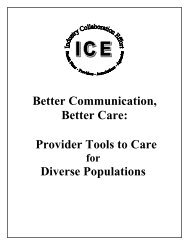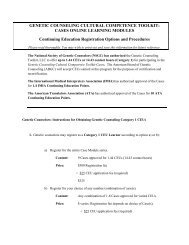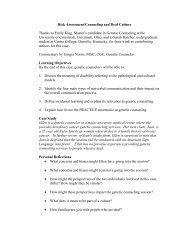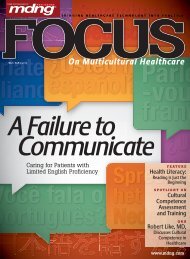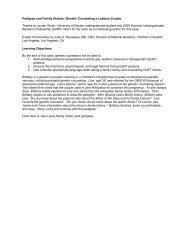Advanced Effective Communication, Cultural Competence, and ...
Advanced Effective Communication, Cultural Competence, and ...
Advanced Effective Communication, Cultural Competence, and ...
You also want an ePaper? Increase the reach of your titles
YUMPU automatically turns print PDFs into web optimized ePapers that Google loves.
A Roadmap for Hospitals<br />
Appendix D: Laws <strong>and</strong> Regulations<br />
requirement to provide a designated level of uncompensated<br />
care to individuals unable to pay [17]. Many hospitals remain<br />
subject to Hill-Burton requirements even though funds are no<br />
longer distributed.*<br />
According to the HHS Office for Civil Rights, every Hill-<br />
Burton hospital must comply with the following basic requirements<br />
to fulfill the community service obligation [18]:<br />
• Meet the right of persons residing in its service area to<br />
medical treatment without regard to race, color, national<br />
origin, or creed<br />
• Participate in the Medicare <strong>and</strong> Medicaid programs unless<br />
they are ineligible to participate<br />
• Make arrangements for reimbursement for services with<br />
principal state <strong>and</strong> local third-party payors that provide reimbursement<br />
that is not less than the actual cost of the services<br />
• Post notices informing the public of its community service<br />
obligations in English, Spanish, <strong>and</strong>, if 10% or more of<br />
the households in the service area usually speak a language<br />
other than English or Spanish, that language as well<br />
• Do not deny emergency services to any person residing in<br />
the hospital’s service area on the grounds that the person is<br />
unable to pay for those services<br />
• Do not adopt patient admissions policies that have the<br />
effect of excluding persons on grounds of race, color,<br />
national origin, creed or any other ground unrelated to<br />
the patient’s need for the service or the availability of the<br />
needed service<br />
Age Discrimination Act of 1975<br />
The Age Discrimination Act of 1975 prohibits discrimination<br />
on the basis of age in programs or activities receiving federal<br />
financial assistance <strong>and</strong> applies to persons of all ages [19]. The<br />
act does not apply to employment or to certain exceptions<br />
that permit, under limited circumstances, use of age distinctions<br />
or factors other than age that may have a disproportionate<br />
effect on the basis of age. This could include age<br />
distinction contained in that part of a federal, state, or local<br />
statute or ordinance which provides any benefits or assistance<br />
to persons based on age, establishes criteria for participation<br />
in age-related terms, or describes intended beneficiaries or target<br />
groups in age-related terms [20].<br />
Section 542 of the Public Health Service<br />
Act: Substance Abusers<br />
Section 542 of the Public Health Service Act prohibits discrimination<br />
in admission or treatment against substance<br />
abusers by hospitals receiving federal funds [21]. A hospital<br />
cannot discriminate against a drug or alcohol abuser or alcoholic<br />
who is suffering from a medical condition, because of<br />
the person’s drug or alcohol abuse or alcoholism.<br />
State <strong>and</strong> Local Laws<br />
Depending on your location, there may be state or local laws<br />
that prohibit discrimination or impose other requirements related<br />
to effective communication, culturally competent, <strong>and</strong><br />
patient- <strong>and</strong> family-centered care. For example, many states<br />
have statutes or regulations requiring meaningful language access<br />
that are more comprehensive than federal law. Some<br />
states also require cultural competency training for health<br />
professionals [22].<br />
References:<br />
1. 42 U.S.C. § 2000d; See also 45 C.F.R. § 80 App. A<br />
2. 42 U.S.C. § 2000d-4a<br />
3. Office for Civil Rights: Fact Sheet: Your Rights under Title IV of the<br />
Civil Rights Act of 1964. Washington, DC: U.S. Department of<br />
Health <strong>and</strong> Human Services, Office for Civil Rights, 2006. Available<br />
at http://www.hhs.gov/ocr/civilrights/resources/factsheets/your<br />
rightsundertitleviofthecivilrightsact.pdf. (Accessed March 3, 2010.)<br />
4. Office for Civil Rights: Guidance to Federal Financial Assistance Recipients<br />
Regarding Title VI Prohibition against National Origin Discrimination<br />
Affecting Limited English Proficient Persons. Washington, DC: U.S.<br />
Department of Health <strong>and</strong> Human Services, Office for Civil Rights,<br />
2003. Available at http://www.hhs.gov/ocr/civilrights/resources/specialtopics/lep/policyguidancedocument.html.<br />
Accessed March 2,<br />
2010.<br />
5. Rehabilitation Act of 1973, 29 U.S.C. § 794.<br />
* A list of facilities covered under Hill-Burton may be found at http://www.hrsa.gov/HILLBURTON/hillburtonfacilities.htm .<br />
75




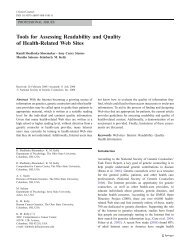


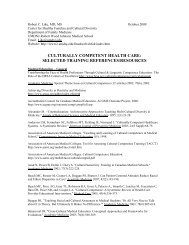
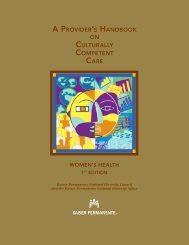
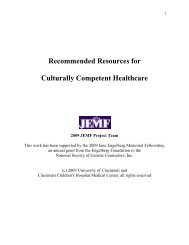
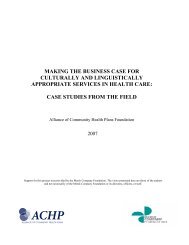
![Breaking Bad News PPT[1] - Genetic Counseling Cultural ...](https://img.yumpu.com/35003134/1/190x146/breaking-bad-news-ppt1-genetic-counseling-cultural-.jpg?quality=85)
